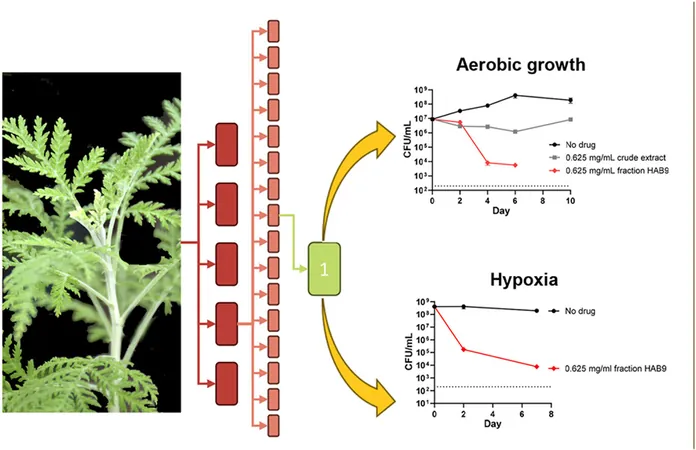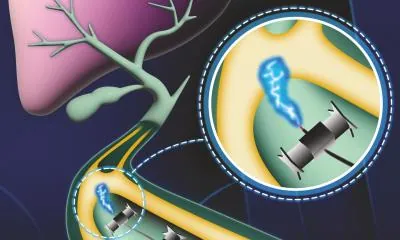
Breakthrough Discovery: Traditional Plant Compound Shows Promise in Fighting Deadly Tuberculosis!
2024-10-02
Breakthrough Discovery: Traditional Plant Compound Shows Promise in Fighting Deadly Tuberculosis!
In an exciting development from the world of ethnopharmacology, researchers have uncovered a potentially life-saving compound found in African wormwood, a plant revered for its medicinal properties for centuries. Published in the Journal of Ethnopharmacology, this new study illustrates how an O-methylflavone derived from this ancient plant could be effective in combatting tuberculosis (TB).
The collaborative research team, led by scientists from Penn State, has demonstrated that this specific chemical compound can target and eliminate mycobacteria responsible for tuberculosis, both when they are actively multiplying and during their more resilient, hypoxic state. This latter state occurs when the bacteria undergo stress, significantly complicating treatment and eradication efforts.
Co-corresponding author and expert Joshua Kellogg, who is an assistant professor of veterinary and biomedical sciences, emphasized the significance of these findings. “Bacteria in this hibernation-like state are notoriously hard to kill,” Kellogg explained. “Our preliminary results indicate that we may have a promising lead in developing alternative therapies against TB.”
With approximately 10 million global cases of TB each year, leading to around 1.5 million deaths, the urgency of such research cannot be overstated. Although we have existing treatments, the lengthy antibiotic regimen—which can stretch from six months to two years for drug-resistant strains—remains a significant barrier to effective management of the disease.
TB bacteria are known to exhibit two forms: one is actively replicating, while the other is in a dormant phase, akin to hibernation, where their metabolic functions are drastically reduced. This dormancy can be triggered by external pressures such as antibiotic treatment, making it particularly challenging to eliminate these bacteria from the body.
The study delved into African wormwood, known historically for treating ailments like cough and fever. Recent findings from clinical studies in Africa suggest that it also holds therapeutic potential for TB. “The raw extracts demonstrate substantial efficacy against TB, but pinpointing the active compounds is essential to harnessing their full potential,” said Kellogg.
In their rigorous examination, the research team utilized a method of fractionating the raw plant extract into simpler chemical profiles. Each fraction was subsequently tested against Mycobacterium tuberculosis (Mtb) to assess their effectiveness. Employing advanced machine learning techniques, they identified two particularly active fractions that warranted further investigation.
Through this process, they isolated one compound that not only killed the bacteria in both its active and dormant states but also exhibited minimal toxicity in laboratory tests using human cells—a rare combination in anti-TB therapies.
While the potency of this newly identified compound is not yet sufficient for direct therapeutic application, it serves as a critical foundation for the design of more powerful drugs and may unlock further therapeutic possibilities. Additionally, researchers suspect there are other beneficial compounds within the African wormwood plant waiting to be discovered.
Looking ahead, Kellogg and his team emphasize the necessity for continued research to further explore the uses of African wormwood in treating tuberculosis. This critical work could pave the way for innovative and effective treatments, potentially saving countless lives in the ongoing battle against one of the world’s most deadly infectious diseases.
Stay tuned for updates on this groundbreaking research, as it could be a game-changer in the fight against TB and beyond!






 Brasil (PT)
Brasil (PT)
 Canada (EN)
Canada (EN)
 Chile (ES)
Chile (ES)
 España (ES)
España (ES)
 France (FR)
France (FR)
 Hong Kong (EN)
Hong Kong (EN)
 Italia (IT)
Italia (IT)
 日本 (JA)
日本 (JA)
 Magyarország (HU)
Magyarország (HU)
 Norge (NO)
Norge (NO)
 Polska (PL)
Polska (PL)
 Schweiz (DE)
Schweiz (DE)
 Singapore (EN)
Singapore (EN)
 Sverige (SV)
Sverige (SV)
 Suomi (FI)
Suomi (FI)
 Türkiye (TR)
Türkiye (TR)